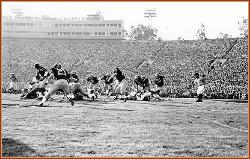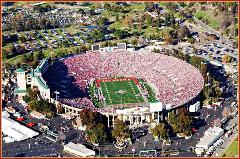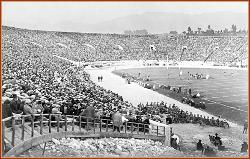



Liberty Bowl Memorial Stadium is a football stadium located at the Mid-South Fairgrounds in Memphis, Tennessee, United States. The stadium is
the site of the annual Liberty Bowl, and is the home field of the University of Memphis Tigers football team. It has also been the host of several
attempts at professional sports in the city, as well as other local football games and other gatherings.
History
The stadium was originally built as Memphis Memorial Stadium in 1965 for $3 million, as a part of the Mid-South Fairgrounds, one of the South’s
most popular fairs. The fairgrounds also include the Mid-South Coliseum (formerly the city’s major indoor venue) as well as the now closed
Libertyland amusement park. It was dedicated to the citizens of Memphis who had served in World War I, World War II, and the Korean War.
It was built partially as a way to bring the Liberty Bowl to a permanent home in Memphis. (The game had started in Philadelphia, but because of
poor attendance for a northern bowl, it left the city, playing one year in Atlantic City before settling in Memphis.) The game was such a success
for Memphis that the stadium was soon renamed Liberty Bowl Memorial Stadium. As originally built, the stadium was lopsided, with the southwest
side being taller than the northeast. A 1987 expansion brought it to its current, balanced size. Its design is similar to that of Tampa Stadium, with
the endzone grandstands being much shorter than the sidelines. The field, which had been natural grass since its inception, was replaced with a
FieldTurf surface before the 2005 season.
The stadium is designed in such a way that all of its seats have a relatively good view of most of the playing surface. This is due primarily to two
design factors. The stands are relatively steep for a one-tier, true bowl stadium. Also, there is little space between the side and end lines of the
playing surface and the stands.
In December, 1983, the field was renamed for Rex Dockery, a former Memphis football coach who died in a plane crash.
Both the annual Liberty Bowl game itself and the stadium bearing its name have been integral parts of the Memphis community for almost four
decades, and it can be argued that, unlike the cases of massive amounts that have been spent on many luxurious sports venues for professional
sports teams in other cities in recent years, the citizens of Memphis have received a reasonable return on the capital invested in the stadium in
the economic activity resulting from all of the events that the stadium has hosted over the years. The failure of the Liberty Bowl to become the
long-term host of a successful professional football team has been more a result of the poorly-planned and executed sports leagues that have
attempted to operate teams there than any inherent fault in the stadium, which was superior to many hosting major sports teams at the time of its
construction, or the Memphis market, although it must be admitted that Memphis and the Liberty Bowl have seemed to have been almost a
magnet for such ventures and that Memphis has endured more of them than any other U.S. city. Unfortunately, in the minds of many, Liberty
Bowl Memorial Stadium has been defined by what it is not – not the home of a successful professional football team, not the home of a "major"
college bowl game, not on-campus at the University of Memphis but not far from it either, not located downtown, but not in the suburbs either.
The stadium, despite all its faults, must be deemed to have been largely successful. It has provided the University of Memphis football team with
a far larger and more impressive facility than could have ever been justified by the Tigers' success on the field or at the gate (or relative lack
thereof), and the City of Memphis a venue for other large events and an annual attraction that may not be in the top echelon of collegiate sports
but nonetheless provides crowds at Memphis hotels and restaurants annually at a time when they would ordinarily be lacking, the last week in
December. The Southern Heritage Classic, usually played near the beginning of the football season in September, has become one of the
premier events in black collegiate sports and always brings a large crowd (sometimes in upward of 60,000 or more). (Usually the SHC and not the
Liberty Bowl game itself is the source of the facility's largest crowd of the season.)








